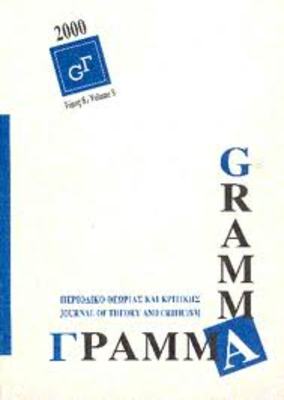The Translator's Invisibility : Handling Irony
Part of : Γράμμα : περιοδικό θεωρίας και κριτικής ; Vol.22, No.1, 2014, pages 143-158
Issue:
Pages:
143-158
Author:
Abstract:
Most translators of Greek drama would agree that different principles apply to the translation of comedy and tragedy. But what of those lighter moments to be found in Aeschylus and Sophocles, and the outright comic aspects of much of Euripides? Tragic irony is usually easy to spot, but is the same true of Euripides for whom palpable parody of Aeschylus may suggest that a similar tone should be found elsewhere in his plays to represent his perceived iconoclasm. Is the danger in making decisions about comic irony that they will determine the translator's interpretation and dictate it to readers, directors and performers?
Subject:
Subject (LC):
References (1):
- Arrowsmith, William. The Bacchae in Euripides V. Chicago: U of Chicago P, 1959. Print.Athenaeus. The Deipnosophists. Trans. Charles Burton Gulick. Cambridge: Harvard UP, 1969. Print.Bassnett, Susan. "When is a Translation Not a Translation?" Constructing Cultures: Essays on Literary Translation. Ed. Susan Bassnett and André Lefevere. Clevedon: Multilingual Matters Ltd, 1997. Print.Burian, Peter, and Alan Shapiro, eds. The Complete Euripides. Vol 4. Oxford: Oxford UP, 2009. Print.Davie, John. Euripides: Medea and Other Plays. London: Penguin, 1996. Print.—-. Euripides: The Bacchae and Other Plays. London: Penguin, 2005. Print.Fischer-Lichte, Erika. Dionysus Resurrected: Performances of Euripides' The Bacchae in a Globalized World. Chichester: Wiley-Blackwell, 2014. Print.Gibbons, Reginald, and Charles Segal. The Bacchae in The Complete Euripides. Vol. 4. Oxford: Oxford UP, 2009. Print.Gladstone, Ralph. The Heracleidae in Euripides I. Chicago: The U of Chicago P, 1955. Print.Hardwick, Lorna, and Christopher Stray, eds. A Companion to Classical Receptions. Maiden: Blackwell, 2008. Print.Henderson, Jeffrey. Aristophanes: Clouds, Wasps, Peace. Cambridge: Harvard UP, 1998. Print.Kitto, Humphrey. Greek Tragedy. London: Methuen, 1961. Print.Kovacs, David. Children of Heracles in Euripides II. Cambridge: Harvard UP, 1995. Loeb Classical Library.Logan, Brian. "Whose Play Is It Anyway?" The Guardian 3 Mar. 2003. Print.McDonald, Marianne, and J. Michael Walton. Euripides' Orestes. 2009. TS. Perry, Grayson. BBC Radio 4 Reith Lecture 3. 29 Oct. 2013. Radio.Plato. The Republic. Trans. H. D. P. Lee. Harmondsworth: Penguin, 1955. Print.Potter, Robert. The Tragedies of Euripides. Vol 1. London: Dodsley, 1781. Print.Taylor, Henry, and Robert A. Brooks, trans. The Complete Euripides: The Children of Herakles. Ed. Peter Burian and Alan Shapiro. Vol. 3. Oxford: Oxford UP, 2010. Print.Vellacott, Philip. The Bacchae and Other Plays. Harmondsworth: Penguin, 1954. Print.—. Menander Plays and Fragments; Theophrastus: The Characters. Harmondsworth: • Penguin, 1967. Print.—. Sophocles and Oedipus: A Study of Oedipus Tyrannus with a New Translation. Ann Arbor: U of Michigan P, 1971; London: Macmillan, 1972. Print.—. Euripides: Orestes and Other Plays. Harmondsworth: Penguin, 1972. Print.—. Ironic Drama: A Study of Euripides' Method and Meaning. Cambridge: Cambridge UP, 1975. Print.—. Oedipus and Apollo: A Study of Sophocles' Two Plays. N.p. Located in the University of Harvard Library, 1991. Print.—. An English Reader's Guide to Sophocles' Two Oedipus Plays: Oedipus Tyrannus and Oedipus Coloneus. Cambridge: Monophron, 1993, Print.Walton, J. Michael. Bacchae in Euripides Plays: One. London: Methuen Drama, 1988. Print.—. Found in Translation: Greek Drama in English. Cambridge: Cambridge UP, 2006. Print.—. "Vacuum or Agenda: The Translator's Dilemma." Classical and Modern Literature 27.1, 2007, 93-120. Print.—. "Enough Give in It: Translating the Classical Play." A Companion to Classical Receptions. Ed. Lorna Hardwick and Christopher Stray. Oxford: Blackwell, 2008. 153-67. Print.—. Euripides Our Contemporary. London: Methuen Drama, 2009. Print




